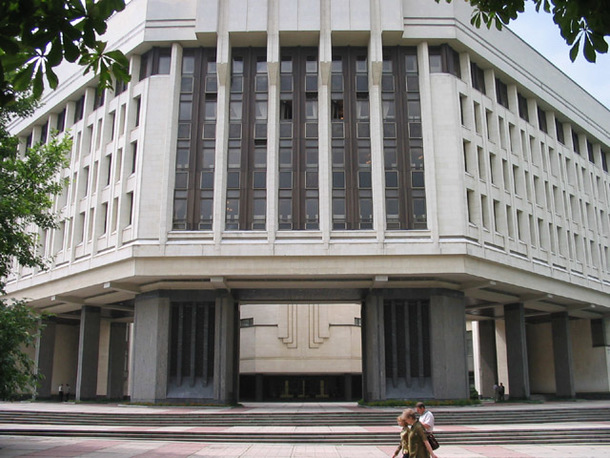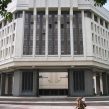
Crimea’s Post-1991 Autonomy ‘Not for Tatars but Against Them,’ Expert Says
Publication: Eurasia Daily Monitor Volume: 10 Issue: 125
By:

A discussion sparked by calls from some Ukrainian nationalists to transform the Crimean Autonomous Republic into the 27th oblast of Ukraine has led to a remarkable admission by a Ukrainian expert. The autonomy that Crimea has enjoyed since 1992 is so small that the republic is almost indistinguishable from a Russian-majority oblast elsewhere in Ukraine, something that should come as no surprise because the Crimean Autonomous Republic was set up in Ukraine not to help the Crimean Tatars who were returning from their exile in Central Asia but to limit their opportunities for pursuing independence.
Queried by Crimea’s QHA news agency, Aleksandr Pilipenko, president of the Center for Electoral Research and Toponymy, said that any call for doing away with Crimea’s autonomy makes no sense because at present, the peninsula’s “autonomy” exists only on paper. “In fact,” he adds, “it does not exist” at all (qha.com.ua/krimskuyu-avtonomiyu-nujno-sozdavat-a-ne-tolko-nazivatsya-eyu-ekspert-128192.html).
That should not surprise anyone who knows either the history of the restoration of the Crimean Autonomous Soviet Socialist Republic (ASSR) in February 1991 at the end of Soviet times or how the ethnic Russian rulers of the peninsula such as Anatoli Mogilev now have behaved, the political scientist says. “In fact,” he notes, Moscow’s decision to restore the Crimean Autonomous Republic came “several months before the mass return of the Crimean Tatars” and, in fact, this “rebirth [of the republic the Crimean Tatars had resided in before Stalin deported them to Central Asia in1944] was not for the Crimean Tatars but against them.”
The communist elites of that time simply wanted to protect themselves against “the arrival of ‘an undesirable contingent’” of Crimean Tatars that might threaten their rule and so established an autonomous republic in order that the elites would not have to divide land or status with the returnees from Central Asia. “That was the nature of the appearance of the Crimean ASSR which quickly became the Republic of Crimea.” Unfortunately, Pilipenko says, none of that changed when the newly independent Ukraine disbanded the Soviet ASSR in favor of a simple “autonomous republic.”
If the pre–World War II Crimean ASSR “had a clear Crimean Tatar coloration,” Pilipenko says, “the one which took its place did not have that and does not have it now.” Indeed, he asks rhetorically, “how is this autonomy distinguished from other Russian-language oblasts that exist [in Ukraine] beyond the borders of Crimea?”
“If we are to speak about giving it real content,” he says, then there are two ways out and not one [as the Ukrainian far right seems to think]: either to recognize de facto that we are [a regular] oblast with a beautiful name, or to give this autonomy real content,” including economic authority and special status for the Crimean Tatars, the Karaims, and the Krymchaks. “Otherwise this autonomy will be without meaning. If autonomy is dear to us, then allow Crimea to be so and not simply bear the title.”
Many Ukrainian experts and politicians have reacted negatively to the proposal last week by the radical nationalist Svoboda Party that there should be an all-Ukraine referendum to strip Crimea of its status as an autonomy and transform it into the 27th oblast of Ukraine. The party’s leaders concede that they are seeking a referendum because they have only 37 seats in the Verkhovna Rada (national parliament) and thus no chance of pushing through the constitutional change through the legislature (km.ru/v-rossii/2013/07/02/vneshnyaya-politika-ukrainy/714918-krymskaya-avtonomiya-odni-khotyat-ee-otmenit-).
Not surprisingly, Anatoli Mogilev, the current leader of the Crimean Autonomous Republic, says that doing away with his territory’s status would be a disaster because “the status of an autonomy plays a most important role in the preservation of inter-ethnic accord on the peninsula, and attempts to change it could destabilize the situation.” Few Crimean Tatars would agree with his first contention, but both they and many others would agree with the second, given that the Tatars are vastly outnumbered in the Crimea and that they do not have sufficient support at present to create a genuinely Crimean Tatar Republic there (for two recent polls on that subject, see lenta.ru/articles/2013/07/02/crimea/).
Among those arguing that changing the status quo in Crimea now would be destabilizing is Vladimir Fesenko, head of the Penta Analytic Center and a member of the Constitutional Assembly appointed by the Ukrainian president. Noting that Crimea is “a very complex region,” he argues that moves to end its autonomy could provoke “separatist attitudes” among Russians and Crimean Tatars, developments that could easily lead “to a chain reaction throughout the entire [country],” something that he says would be “very dangerous” (www.ng.ru/cis/2013-07-02/1_crym.html).
There is at least one good piece of news: Having discovered the level of opposition to their idea and recognizing that it is going nowhere fast, the leaders of the Svoboda movement have backed down and say they will not push the issue until 2015 at the earliest. But having raised this populist issue, they have done real damage, and their retreat will not alter that fact.




